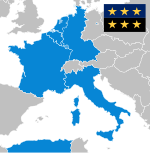Portal:European Union
Introduction
The European Union (EU) is a supranational political and economic union of 27 member states that are located primarily in Europe. The Union has a total area of 4,233,255 km2 (1,634,469 sq mi) and an estimated total population of over 448 million. The EU has often been described as a sui generis political entity (without precedent or comparison) combining the characteristics of both a federation and a confederation. Containing 5.8% of the world population in 2020, EU member states generated a nominal gross domestic product (GDP) of around US$16.6 trillion in 2022, constituting approximately one sixth of global nominal GDP. Additionally, all EU states except Bulgaria have a very high Human Development Index according to the United Nations Development Programme. Its cornerstone, the Customs Union, paved the way to establishing an internal single market based on standardised legal framework and legislation that applies in all member states in those matters, and only those matters, where the states have agreed to act as one. EU policies aim to ensure the free movement of people, goods, services and capital within the internal market; enact legislation in justice and home affairs; and maintain common policies on trade, agriculture, fisheries and regional development. Passport controls have been abolished for travel within the Schengen Area. The eurozone is a group composed of the 20 EU member states that have fully implemented the economic and monetary union and use the euro currency. Through the Common Foreign and Security Policy, the union has developed a role in external relations and defence. It maintains permanent diplomatic missions throughout the world and represents itself at the United Nations, the World Trade Organization, the G7 and the G20. Due to its global influence, the European Union has been described by some scholars as an emerging superpower. In 2012, the EU was awarded the Nobel Peace Prize. The United Kingdom became the only member state to leave the EU, in 2020; ten countries are aspiring or negotiating to join it. (Full article...) Selected article The ECSC was first proposed by French foreign minister Robert Schuman on 9 May 1950 as a way to prevent further war between France and Germany. He declared his aim was to 'make war not only unthinkable but materially impossible.' The means to do so, Europe's first supranational Community, was formally established in 1951 by the Treaty of Paris, signed not only by France and West Germany, but also by Italy and the three Benelux states: Belgium, Luxembourg and the Netherlands. Between these states the ECSC would create a common market for coal and steel. The ECSC was governed by a 'High Authority', checked by bodies representing governments, MPs and an independent judiciary. The ECSC was joined by two other similar communities in 1957, with whom it shared its membership and some institutions. In 1969 all its institutions were merged with that of the European Economic Community (EEC, which later became part of the European Union), but it retained its own independent identity. However in 2002 the Treaty of Paris expired, and with no desire to renew the treaty, all the ECSC activities and resources were absorbed by the European Community. During its existence, the ECSC had succeeded in creating a common market but could not prevent the decline of the coal and steel industries. It did however set the ground for the future European Union. Selected picturePhotograph credit: Uoaei1 Aggstein Castle is a ruined castle on the right bank of the Danube in Wachau, Austria. It was built in a strategic position on a rocky crag in the 12th century, but little of the original structure remains. In 1429, it was razed and rebuilt by Jörg Scheck von Wald, and the three-storey women's tower, the palace and the Gothic chapel date back to this period, as does the famous rose garden. Anna Freiin von Polheim und Parz carried out renovations in the early 17th century, but after her death, the building deteriorated and stones and timber were removed for use in the construction of a nearby Servite convent.
Did you know?...that Monaco, San Marino, and Vatican City all mint their own euro coins, with their own national symbols on the back, despite not being EU members? Selected cityPrague is the capital and largest city of the Czech Republic. Situated on the Vltava river in central Bohemia, it is home to approximately 1.2 million people. Since 1992, the historic center of Prague has been included in the UNESCO list of World Heritage Sites. According to Guinness World Records, Prague Castle is the largest ancient castle in the world. The land where Prague was to be built has been settled since the Paleolithic Age. Several thousands of years ago, there were trade routes connecting southern parts of Europe to northern Europe which passed through this area, following the course of the river. From around 500 BC the Celtic tribe known as the Boii, were the first known inhabitants of this region known by name. The Boii named the region Bohemia and the river Vltava. In between the 6th and 9th centuries AD the Germanic tribe Marcomanni migrated to Bohemia and other Germanic tribes followed during the 5th century AD, but in the 6th century their elites and majority of inhabitants moved to the Danubian area which enabled a Slavic tribe invading from the West, to settle this area. The Czech Slavic tribe came to Bohemia in the 6th century and Forefather Czech became the founder of the Czech nation. General imagesThe following are images from various European Union-related articles on Wikipedia.
TopicsFeatured contentFeatured articles
Featured lists
Featured contentGood articles
CategoriesRelated portalsAssociated WikimediaThe following Wikimedia Foundation sister projects provide more on this subject:
Discover Wikipedia using portals |
































































